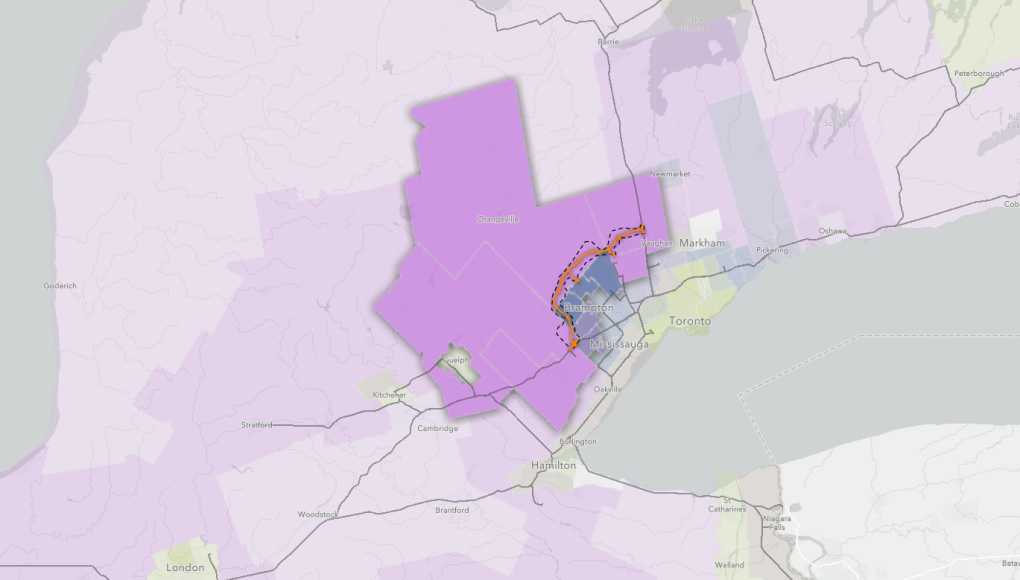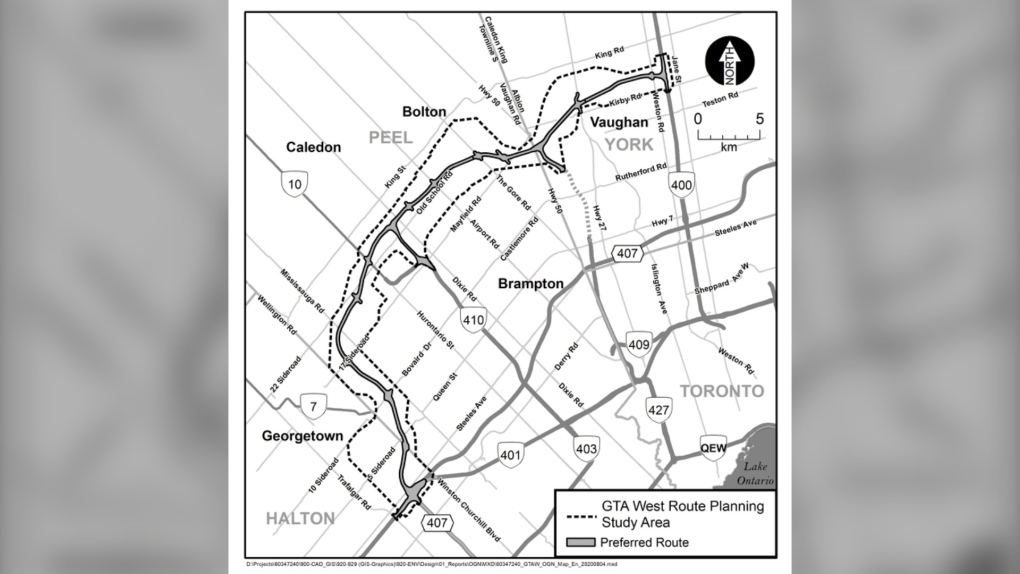About 17.5K people sign petition to stop Highway 413 in Ontario
 A map of proposed Highway 413 and the ridings it travels through. (Environics Analytics)
A map of proposed Highway 413 and the ridings it travels through. (Environics Analytics)
About 17,500 people have now signed a petition asking the federal government to intervene and stop Ontario’s plan to build Highway 413.
The David Suzuki foundation first launched a petition to halt the proposed highway last year, asking Canada’s Minister of Environment and Climate Change to put a stop to the project.
“The highway has to go through a federal impact assessment, and so we're saying to Minister (Steven) Guilbeau, ‘You need to look into this, this is a serious matter and you need to be weighing in,’” Gideon Forman, a transportation policy analyst at the David Suzuki Foundation, told CTV News Toronto.
“Ontarians love their Greenbelt and they don't want to see a new mega highway that will destroy part of (it).”
Forman said the foundation has been in contact with the provincial government, but officials have not been receptive of their concerns.
“They insist that we need this highway. Well, we beg to differ. We think the highway is completely unnecessary and very harmful.”
The six-lane, 52-kilometre proposed roadway was a major campaign pledge for the Doug Ford Progressive Conservatives. Their proposal would see the highway travel from Halton to York Region and connect to highways 401, 407 and 410.
The Ontario government has said it will save commuters about 30 minutes in driving time.
 The proposed route of Highway 413 is shown. (Ontario Ministry of Transportation)
The proposed route of Highway 413 is shown. (Ontario Ministry of Transportation)
Advocates, however, have argued the government is downplaying the impact the new highway would have on the environment, something Forman agrees with.
He said the highway would destroy hundreds of acres of farmland in southern Ontario as well as impact multiple animal species.
“It would cross many rivers and that imperils fish and other animals that live in these river valleys,” he said. “A part of the highway would go just north of Toronto. There's just not a lot of woods and forests and wetlands that are left north of Toronto. So the idea of paving them is just ludicrous.”
“The other piece from a directly selfish point of view is that (it will) cross rivers, like the Humber River and the Credit River, go into Lake Ontario, which is the source of our drinking water in Toronto and many other communities.”
A report published in October 2022 by Canadian environmental advocacy group Environment Defence identifies at least 29 “federally identified species at risk” that will be impacted by the highway.
The report also says the proposed highway would cross about 132 streams and rivers, and result in the loss of about 400 acres of “significant natural areas and/or Greenbelt land.”
“Highway 413 would push endangered species in the area even closer to the brink, while we’re in the midst of a global biodiversity crisis. Some scientists are referring to this period as the sixth great extinction – and Highway 413 would accelerate that,” Keith Brooks, programs director for environmental defence, said in a statement. “It’s unconscionable.”
The government, for its part, has said the preferred route for the highway was chosen “in part to minimize impacts to the Greenbelt.”
In May 2021, the federal government determined Highway 413 warranted designation under the Impact Assessment Act, a piece of legislation that gives them the authority to evaluate how climate change may be impacted by the project.
A spokesperson for Guilbeault’s office told CTV News Toronto the Impact Assessment Agency is waiting for the province to submit its description for the highway before it starts its review.
“Throughout the Impact Assessment Process, the agency will collect science and Indigenous knowledge, and receive feedback from the public and stakeholders,” the spokesperson said.
“At the end of the impact assessment process, the agency will make a recommendation on if the project should or should not move forward as planned.”
The Ontario government, meanwhile, says they have provided the draft project description to the federal government and are working on the final submission.
“This is a complex process, and we are working diligently to meet the requirements so that we can deliver on our plan to build Highway 413 as soon as possible,” spokesperson for the Ministry of Transportation Dakota Brasier said. “Throughout the Environmental Assessment, we will continue to develop refinements and mitigations to minimize any potential impacts that are identified for the project.”
Brasier added that Ontarians voted “overwhelmingly in favour of the government’s plan to get critical infrastructure, like Highway 413, built.”
It is still not clear how much Highway 413 will cost.
A data analysis by Environics Analytics, conducted in May prior to the provincial election, showed that ridings impacted by the highway consist primarily of voters who drive above the provincial average of 22,073 kilometers a year.
CTVNews.ca Top Stories

B.C. tenants evicted for landlord's use after refusing large rent increase to take over neighbouring suite
Ashley Dickey and her mother rented part of the same Coquitlam duplex in three different decades under three different landlords.
Mountain guide dies after falling into a crevasse in Banff National Park
A man who fell into a crevasse while leading a backcountry ski group deep in the Canadian Rockies has died.
Expert warns of food consumption habits amid rising prices
A new survey by Dalhousie University's Agri-Food Analytics Lab asked Canadians about their food consumption habits amid rising prices.
MPP Sarah Jama asked to leave Ontario legislature for wearing keffiyeh
MPP Sarah Jama was asked to leave the Legislative Assembly of Ontario by House Speaker Ted Arnott on Thursday for wearing a keffiyeh, a garment which has been banned at Queen’s Park.
Charlie Woods, son of Tiger, shoots 81 in U.S. Open qualifier
Charlie Woods failed to advance in a U.S. Open local qualifying event Thursday, shooting a 9-over 81 at Legacy Golf & Tennis Club.
Ex-tabloid publisher testifies he scooped up possibly damaging tales to shield his old friend Trump
As Donald Trump was running for president in 2016, his old friend at the National Enquirer was scooping up potentially damaging stories about the candidate and paying out tens of thousands of dollars to keep them from the public eye.
Here's why provinces aren't following Saskatchewan's lead on the carbon tax home heating fight
After Prime Minister Justin Trudeau said the federal government would still send Canada Carbon Rebate cheques to Saskatchewan residents, despite Saskatchewan Premier Scott Moe's decision to stop collecting the carbon tax on natural gas or home heating, questions were raised about whether other provinces would follow suit. CTV News reached out across the country and here's what we found out.
Montreal actress calls Weinstein ruling 'discouraging' but not surprising
A Montreal actress, who has previously detailed incidents she had with disgraced Hollywood producer Harvey Weinstein, says a New York Court of Appeals decision overturning his 2020 rape conviction is 'discouraging' but not surprising.
Caleb Williams, Jayden Daniels and Drake Maye make it four NFL drafts with quarterbacks going 1-3
Caleb Williams is heading to the Windy City, aiming to become the franchise quarterback Chicago has sought for decades.

































